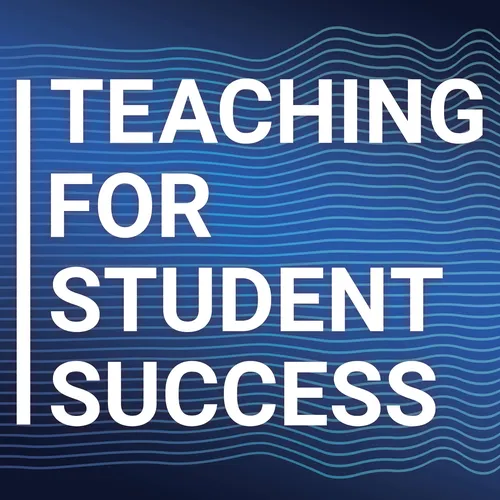
Teaching for Student Success
A podcast for instructors in higher education who may be pressed for time, to learn about evidence-based teaching practices that have been shown to improve student success, equity, and inclusivity.
- Update frequency
- every 19 days
- Average duration
- 51 minutes
- Episodes
- 33
- Years Active
- 2021 - 2023

Grades Do Harm! And Who Are They For Anyway? with Jesse Stommel
Grades demotivate student learning. That is a problem. Faculty also often spend significant amounts of time grading. Another problem. So, if we know grading demotivates learning and we are spendi…

Inclusive Excellence: Content Is Not Enough!
Content isn’t enough! The classroom environment that you create can foster learning or impede learning. If you really are here for all of your students, and I think you are, then it is critical to …

The Syllabus Lives: Known, Needed & Cared For with Matthew Cheney
A huge amount of information must be provided to students at the outset of every course. Enter the SYLLABUS! A universal one-way communication tool that can set the tone for your course and for you…

Alternative Grading: Working With Students, Not Against Them with David Clark and Robert Talbert

Peer Mentoring’s Long Term Impact: Time for National Implementation?
For decades, the United States has been trying to increase the number of STEM professionals from underrepresented groups - with limited success. Retention and persistence at the undergraduate level,…

Ungrading in Practice: No Going Back with Dr. Sue Steiner
UNGRADING! You might already implement some form of UNGRADING but it is more likely that you don’t. Perhaps you heard of UNGRADING and dismissed it, or thought about it but decided it wasn’t the rig…

Learning vs. Feelings of Learning: Paradox Tested
OLD NEWS: A 2014 meta-analysis by Scott Freeman and colleagues of 225 peer-reviewed studies concluded that students taught in an active learning environment significantly outperform peers taught usin…

Inclusify Your Teaching: Learning is for Everyone with Kelly Hogan and Viji Sathy
In higher education our introductory classes are more diverse than ever. That’s great! Our graduating classes? Less diverse. That’s bad! Faculty play a critical role in this loss of diversity and…

Strangers in a Strange Land: How Black Students Succeed at a Primarily White Institution
Higher education is recognizing the importance and value of diversity and inclusivity in our institutions, our classes, our majors, and in the workforce. Along with this recognition are efforts to i…

Connecting Classroom Inequities to Student Performance: EQUIP, a Tool for All? with Daniel Reinholz
As researchers study the success of students in active classrooms, they expose new questions to ask, they generate new data to analyze. These data put classrooms implementing active learning practic…

Teacher Noticing and the Generative Classroom with Dr. Tessa Andrews
In this episode we parse the massive Active Learning Umbrella and discuss a particular type of active learning classroom, the generative classroom in which students generate their knowledge. Dr. Tes…

The Benefits of Diverse Role Models: The Scientist Spotlights Initiative with Jeff Schinske
Who were your role models growing up? In particular, who were your role models that led you to your career in academia? I’m going to guess that most of your academic role models were teachers who lo…

Microaggressions: Language Matters with Colin Harrison
In daily life, we seem inundated by negative talk and negative messaging. Open the newspaper, listen to talk radio, don’t even start me on social media! But our classrooms, our classrooms should be…

Instructor Talk Continues: Students Hear What You Say…. And They Remember!
In Episode 2 Dr. Kimberly Tanner introduced us to Instructor Talk, the non-content language used by instructors. In this episode, listen to a fascinating discussion with Drs. Ovid and Rice about the…

Universal Design for Learning: Watch This Beauty Unfold with K. Behling and T. Tobin
How can you best help ALL of your students learn when they are all different? They each have their own complex lives and life histories. Listen to Kirsten Behling and Thomas Tobin talk about bringi…

The Most Contentious Subject in the Scholarship of Teaching and Learning with Dr. Jessamyn Neuhaus
Episode 16 is Part 2 of my conversation with Dr. Jessamy Neuhaus. We discuss the importance of time for reflection, the practice of gratitude, and the challenges of student evaluations of teaching…

The Research is Pretty Clear… with Dr. Jessamyn Neuhaus
“The Research is Pretty Clear that there is one thing and only one thing that across the board improves teaching. Do you know what that is, Steve?”
This is the first episode of two part series with…

Faculty Mindset: A Hidden Bias That Impacts Student Success
Many faculty participate in professional development programs that promise increases student success and decreases in the opportunity gap. Programs that train faculty in evidence-based practices hav…

Stress, Grades, and the American Way! Time for a Re-boot.
The percentage of students on our campuses suffering from depression doubled from 2009 to 2019. Student suicides increased 50% over the same period. The pandemic probably hasn’t helped. Campuses na…

Failure Is Just A Learning Opportunity: Growth Mindset vs. Economic Disadvantage with Dr. Susana Claro
Many of your students grew up economically disadvantaged. Without intervention, economically disadvantaged students are more likely to leave the academy than economically advantaged students. While…